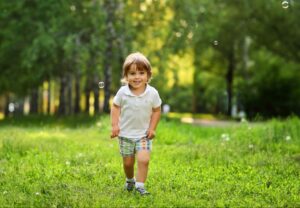
By the time children turn 2, they undergo significant developmental changes across various areas, including motor skills, language, social interaction, and cognitive abilities. Each child grows at their own pace, but understanding the typical developmental milestones can help parents track their child’s progress and identify areas where they might need additional support.
This blog post will explore the key developmental milestones for 2-year-olds and offer some tips for fostering healthy growth in these crucial early years.
1. Physical and Motor Skills Development
At age 2, children often exhibit more control over their bodies, becoming increasingly independent with activities such as walking and running. Specific physical milestones mark their growing coordination:
- Walking and Running: Most 2-year-olds can confidently walk and may even begin running. They typically enjoy exploring their environment on foot and can easily navigate uneven surfaces.
- Climbing: Two-year-olds love climbing on furniture, playground equipment, and stairs. This climbing ability shows improved balance and coordination.
- Kicking and Throwing a Ball: Many children at this age can kick a ball forward and throw it overhand. They might not always have perfect aim, but their motor control is rapidly improving.
- Building Towers and Using Toys with Purpose: Your child might enjoy stacking blocks to build a tower or using toys like puzzles with more intention and skill.
- Scribbling and Drawing: Fine motor skills are also developing, and your 2-year-old may enjoy scribbling on paper and trying to imitate drawing shapes. They might be able to hold a crayon more comfortably and control their movements.
Encouraging Physical Growth
- Provide plenty of opportunities for physical activity, including time outdoors where they can run and explore.
- Engage them in activities that require both gross motor (e.g., kicking a ball) and fine motor skills (e.g., building with blocks).
- Supervise climbing and other physical activities to ensure safety.
2. Cognitive Development
Cognitive growth in 2-year-olds is reflected in their growing curiosity, memory, and problem-solving abilities. Here are some key cognitive milestones:
- Understanding Cause and Effect: At this stage, your child is starting to understand simple cause-and-effect relationships. For example, they know that pushing a button on a toy makes a noise or that turning the door handle opens it.
- Imaginative Play: Imaginative or pretend play becomes a regular activity. Your child may enjoy pretending to feed a doll or act out scenes they’ve observed.
- Naming Familiar Objects: By age 2, children can identify and name common objects in their environment. This indicates growing memory and vocabulary.
- Following Simple Instructions: Most 2-year-olds can follow two-step directions, such as “pick up the toy and give it to me.” This demonstrates the ability to comprehend and act on verbal commands.
- Sorting and Classifying: Your child may start sorting objects by shape, color, or size. This helps lay the foundation for more advanced cognitive skills like mathematics.
Encouraging Cognitive Development
- Engage in interactive play, such as building blocks or puzzles, to help your child develop problem-solving skills.
- Offer simple tasks with multiple steps to enhance their ability to follow directions.
- Encourage pretend play by providing toys like dolls, action figures, or kitchen sets.
3. Language and Communication Development
Language development accelerates between ages 1 and 2, with significant progress in vocabulary and sentence formation. At this age, you may notice the following milestones:
- Expanding Vocabulary: By age 2, children typically have a vocabulary of around 50 to 100 words, and it’s rapidly expanding. They will be able to name familiar objects, people, and animals.
- Combining Words: Your child will begin forming simple two- to three-word sentences, such as “more milk” or “Where’s daddy?” These early sentence structures indicate progress in understanding grammar and communication.
- Repeating Words and Phrases: Many 2-year-olds will repeat words or phrases they hear, which helps them learn new vocabulary and sentence structures.
- Asking Simple Questions: As their curiosity grows, your child may ask simple “what” and “where” questions. They are learning how to use language to get information.
- Understanding and Following Simple Commands: As part of their receptive language skills, 2-year-olds can understand and act on basic instructions, like “Bring me your shoes” or “Sit down.”
Encouraging Language Development
- Read to your child daily, pointing out pictures and talking about the story.
- Engage in conversations with your child, even if their responses are limited. Encourage them to express their thoughts.
- Play games that involve naming objects, animals, or body parts to expand their vocabulary.
4. Social and Emotional Development
At age 2, social and emotional growth is marked by greater independence but also emotional fluctuations as children learn how to express themselves and interact with others. Key milestones include:
- Developing Independence: Your child will likely start showing more independence, wanting to do things themselves, such as feeding or dressing. While this is a positive development, it can sometimes lead to frustration when tasks are challenging.
- Parallel Play: Two-year-olds typically play parallel, playing alongside other children but not necessarily with them. This type of play is an important precursor to cooperative play, which develops later.
- Showing Affection: You may notice your child giving hugs and kisses to family members or even favorite toys. This demonstrates their growing ability to express affection.
- Temper Tantrums: It’s normal for 2-year-olds to experience frequent temper tantrums. These emotional outbursts occur because they are learning to deal with strong emotions like frustration and anger but don’t yet have the words to express them.
- Separation Anxiety: While separation anxiety often begins earlier, some children may still experience anxiety when separated from parents or caregivers at this age.
Encouraging Social and Emotional Development
- Give your child choices to foster independence (e.g., “Do you want the red shirt or the blue one?”).
- Use positive reinforcement to praise good behavior and encourage cooperation.
- Practice patience and empathy when dealing with tantrums, offering comfort and helping your child name their feelings.
- Arrange playdates or group activities to encourage social interaction.
5. Tips for Parents of 2-Year-Olds
- Maintain a Routine: A consistent daily routine helps your child feel secure and gives them the structure to manage their emotions.
- Be Patient with Tantrums: Tantrums are a normal part of development as your child learns to navigate their emotions. Offer support and help them understand their feelings.
- Encourage Exploration: Children love to explore their environment at this time. Provide safe spaces where they can discover new things and challenge their growing abilities.
- Engage in Reading and Play: Both reading and play are essential tools for cognitive, emotional, and social development. Make time for these activities each day.
- Consult Your Pediatrician: If you notice that your child is not meeting important milestones, it’s a good idea to talk to your pediatrician. Early intervention can make a big difference in supporting a child’s development.
Understanding the developmental milestones for 2-year-olds can help parents support their child’s growth in all areas—physical, cognitive, language, and social. Keep in mind that every child is unique, and milestones can vary. However, offering a nurturing and stimulating environment can foster healthy development and prepare your child for the exciting years ahead.
If you have concerns about your child’s development or want to ensure they are meeting important milestones, don’t hesitate to reach out to HealthPark Pediatrics. Our experienced team is here to support you and your little one every step of the way. Schedule an appointment today, and let’s work together to nurture your child’s growth and development.









